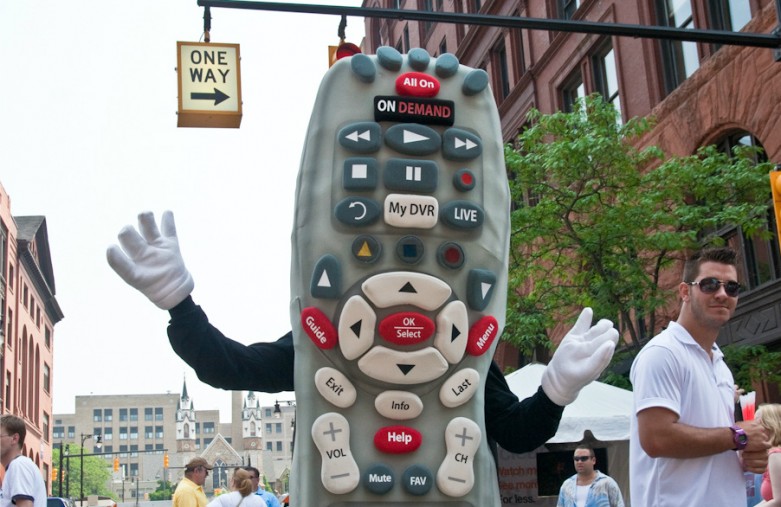
Comcast's Epic Fails
Florida resident Benny Druin needed Comcast to come out for a service call. No big deal, right?
Well, the first technician couldn’t do the job. Nor could the second technician, who was supposed to arrive first thing in the morning and instead didn’t show up until 6:45 p.m.
If this were a fairytale, the third technician would have proven the charm, but he too didn’t know what to do. He left Druin’s house to call his supervisor — and never came back.
“After three days of not going to work and over eight hours on the phone … I am still without Comcast service in my house,” Druin told The Verge.
If you’re a Comcast customer, this story likely feels all too familiar.
If you aren’t a Comcast customer, don’t breathe a sigh of relief just yet: Experiences like Druin’s could be in store for you if the government signs off on the company’s merger with Time Warner Cable.
Comcast is already enormous, and if this deal goes through its service area will cover nearly two-thirds of the U.S. — giving it the power to dictate prices and practices throughout the industry. That’s why The Verge’s “Comcast Confessions” series reads like a cautionary tale.
The Verge interviewed Druin and many other frustrated customers — and more than 150 current and former Comcast employees — for the series. And the piece “Why the Cable Guy Is Always Late” shows that we actually shouldn’t blame technicians for those botched service calls.
In fact, it’s all Comcast’s fault.
Employees told The Verge that Comcast fails to train people properly and overschedules technicians to the point where it’s impossible for them to make every appointment. Tech-support reps told The Verge that they get anywhere from three days to eight weeks of training — and even the longer trainings focus much more on products than on, you know, learning how to fix things.
Comcast’s customer-service staff faces similar pressures. As customer Ryan Block’s infamous call to Comcast shows, even something as straightforward as cancelling service is not necessarily an easy matter — thanks to Comcast’s push to turn every interaction into a sales pitch.
Consider the story of former Comcast billing specialist Brian Van Horn, profiled in “When Every Call Is a Sales Call.” He explains how the standard sales pitch got more “aggressive” over time — to the point where selling products was the only thing that mattered:
Van Horn says he ‘couldn’t sell water to a man dying of thirst in the desert,’ but his other metrics were good: He had high scores on ‘first call resolution,’ meaning that customers’ issues were often fixed in a single call, as well as ‘attaboys,’ where a customer asked to speak to a supervisor in order to compliment him for a job well done. But after repeated reprimands for low sales, Van Horn was fired.
And just imagine how much worse things could get if Comcast succeeds in its $45 billion bid to take over Time Warner Cable and has that much less incentive to offer reasonable rates, build out access to underserved communities or protect free speech online.
Comcast likes to trot out promises to sell the government on its mergers. In 2011 it launched its Internet Essentials program, which serves low-income customers, to woo regulators in its bid to buy NBCUniversal.
The gambit worked then, and so — just in time for the government review of the Comcast-Time Warner Cable deal — Comcast renewed the program, which was set to expire. (It’s probably no coincidence that Comcast also recently began offering six months of free service to those who sign up for Internet Essentials by Sept. 20.)
The problem is that Internet Essentials has significant barriers to enrollment — and it serves just a small percentage of those who are eligible to enroll. It's not a comprehensive solution for those caught on the wrong side of the digital divide.
Then there’s Comcast’s claim that the merger would provide “full” Net Neutrality protections to more Americans. As a condition of the NBCUniversal deal, Comcast agreed to abide by the FCC’s (recently overturned) Open Internet Order. But that merger condition expires in 2018, and in any case the Open Internet Order didn’t come close to providing full Net Neutrality.
Still think we should trust Comcast’s promise here? Well, the company has misbehaved while ostensibly operating under these rules, favoring its own content over others.
In short, Comcast doesn’t have a leg to stand on. This is a big bad company and we can’t let it grow even bigger. There’s no way a merger of this size would serve the public interest.
If you haven’t already, tell the FCC why this merger will benefit no one but Comcast. Comments are due on Aug. 25.
Original image by Flickr user Steven Depolo